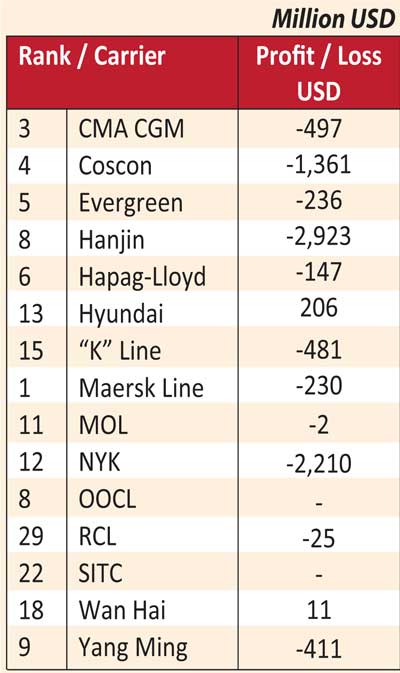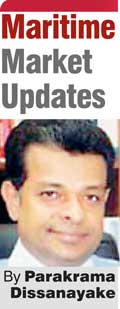Monday Mar 02, 2026
Monday Mar 02, 2026
Monday, 5 December 2016 00:01 - - {{hitsCtrl.values.hits}}
 Q3 Container Shipping Record, Red
Q3 Container Shipping Record, Red
To date, 15 top carriers posted their financial results for the nine months of 2016, or fist six in case of the Japanese. Across the board, turnover declined and for 13, there were net losses. Only Hyundai and Wan Hai managed to make (small) gains. Even with these contributions, the combined result of this 15 was still a big minus of $ 8.3 billion and which was $ 5.4 billion worse than for 9M 2016. Hanjin was the unfortunate ‘loss-leader’ at $-2.9 billion with NYK, in the space of six months, posting a loss in excess of $ 2 billion too.
First nine months 2016 revenues per TEU compared to those of a year earlier continue to reflect substantial reductions in freight rates, as referred in DynaLiners.
Maersk Line to Buy Hamburg Sud in $ 4 billion deal
Maersk Line Thursday announced it is buying German carrier Hamburg Sud from the Oetker Group and aims to close on the deal by the end of 2017. The acquisition, the subject of speculation for the past few weeks, will cement Maersk’s position as the world’s biggest container shipping line. Following the takeover, Maersk plans to operate joint North-South services with Hamburg Sud, which will increase frequencies, spread the line’s geographical coverage and cut transit times.
The acquisition of Hamburg Sud is in line with our growth strategy and will increase the volumes of Maersk Line and APM Terminals (Maersk’s port unit) said Soren Skou, CEO of Maersk Line and the Maersk Group on a teleconference about the acquisition.
The Danish carrier did not reveal how much it is paying for the world’s seventh-largest container line, but it has been widely reported that the sale price will be around $ 4 billion. We have offered a fair price for a quality company, Skou said on the call. Today is a milestone in Maersk Line’s history, the Maersk CEO said in a written statement announcing the deal.
Hamburg Sud complements Maersk Line and together we can offer our customers the best of two worlds, first of all in the North-South trades.
Hamburg Sud is the only one of the top 10 container lines with a strong focus on North/South trades, particularly to and from South America, with only very limited coverage of the major East-West trades through slot exchange agreements with United Arab Shipping Company and a few others, reports JOC.
The EU’s liner shipping investigation
The European Commissionrecently closed its long running investigation into potential anticompetitive practices in the container liner shipping sector after the companies under investigation offered to enter into binding commitments with the Commission regarding their future conduct. These commitments addressed the Commission’s concerns that publication of future pricing intentions for identified routes allowed competitors to coordinate pricing behaviour.
This investigation has important implications for this sector as the way shipping lines can announce pricing intentions has now changed to become less flexible.
The case also highlights the Commission’s position that merely making price announcements can be construed as an invitation to collude or price signalling which can lead to illegal price coordination even without direct contract between competitors. To alleviate the Commission’s concerns, the lines offered commitments for a period of three years, starting from 7 December, to:
 The commitments brought the investigation to a close, meaning the Commission was not required to formally conclude the price announcements had breached competition rules. Arguably, this is a good solution for both sides with the burden on the lines manageable and the Commission avoiding lengthy legal challenges to an infringement decision that would have provoked considerable controversy. The 14 lines are now bound to comply with the commitments and could face considerable penalties for breach of the commitments (up to a hypothetical maximum of 10% of global turnover), without the Commission needing to conduct further analysis.
The commitments brought the investigation to a close, meaning the Commission was not required to formally conclude the price announcements had breached competition rules. Arguably, this is a good solution for both sides with the burden on the lines manageable and the Commission avoiding lengthy legal challenges to an infringement decision that would have provoked considerable controversy. The 14 lines are now bound to comply with the commitments and could face considerable penalties for breach of the commitments (up to a hypothetical maximum of 10% of global turnover), without the Commission needing to conduct further analysis.
However, the limited three-year duration of the commitments begs the questionsas to how the Commission would respond if historic practices are re-introduced thereafter. Does it have the appetite to take on the lines again on the illegality of public price announcements? The burden of proof for the Commission is high in such cases, but equally shipping lines and others in the sector will now think twice about their price announcement strategies for fear of investigation, as referred in ‘Shipping Law News’.
Consolidation in global container shipping; shippers raise concerns
The European Shippers’ Council (ESC) and the Global Shippers’ Forum (GSF) have joined forces to raise concerns over the impacts of new container shipping alliances and their increasing use of 18,000 TEU mega-ships.
Shippers are fearing that the contraction or consolidation of the shipping market into a very small number of tightly knit alliances and the use of much larger ships, will reduce their choice of carrier and the quality of the services delivered.
The shippers argued that carriers operating within such arrangements cannot compete amongst themselves with regard to the agreed capacity, sailing frequency, transit times, ports of all and service level.
The ESC has joined GSF to promote the findings of a new research and analysis, titled ‘The Implications of Mega-Ships and Alliances for Competition and Total Supply Chain Efficiency: An Economic Perspective’, commissioned by GSF. The GSF paper makes a series of recommendations to competition authorities and regulatory bodies around the world to mitigate the possible implications for competition in key liner trades arising from a reduced pool of competing carriers.
It offers a range of options for national and regional competition authorities on how to approach the regulation and oversight of the new shipping alliances. Some of the options include ensuring sufficient and independent competition on key trade routes, repealing existing exemptions from antitrust laws and implementing monitoring of alliances. GSF has made the voice of shippers heard in the UN agencies responsible for regulation of the maritime sector and supported many of its member associations in advancing more transparent regulation of the container shipping industry in their home markets, said GSF Chairman Bob Ballantyne. ESC, with its network of contracts in the European institutions, will bring further pressure to bear in the key European liner markets, said Ballantyne. ESC Chairman Denis Choumert commented: “ESC is pleased to be working with GSF on this critical issue of the necessary evolution of the structure and regulation of global container shipping.”
363 container ships/1.5 million TEU capacity, idle
Compared to two weeks earlier, the 14 November 2015 idle fleet shrank by 96,000 TEU and 34 ships.
The biggest change came in the 2,000 – 2,999 range which dropped by 19 ships. Overall, as at 14 November, 363 ships were idle for a capacity a touch short of 1.5 million TEU, equivalent to 7.4% of the global fleet. The suspicion is that the reduction in the idle fleet is down more to scrapping than to ships returning to gainful employment.
Taiwanese Government to fund shipping
To prevent its shipping firms from suffering a potential collapse, the Taiwanese government has allocated a TWD 60 billion ($ 1.9 billion) fund to help local shipping companies in distress.
Those having made losses over the past four consecutive quarters can apply for low-interest loans. Furthermore, the government will offer port charges discounts and help cash-strapped carriers to extend their loan maturity. Both Evergreen and Yang Ming would actually fit those conditions, records DynaLiners.
(The writer a Maritime Economist is a Chartered Fellow (Logistics Transport), Chartered Shipbroker (UK), Chartered Marketer (UK) and a University of Oxford Business Alumni. He is also a Fellow of NORAD/JICA and Harvard Business School (EEP).)